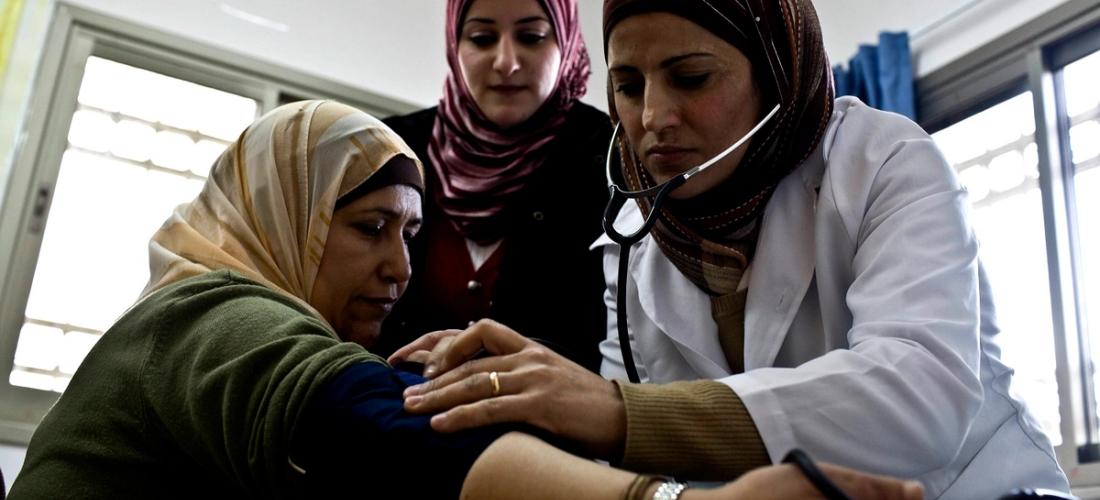4 Ways to Be Proactive About Your Medical Tests & Health As You Approach Middle Age
Lifestyle
|
Oct 10, 2023
|
6 MIN READ

Image source: USAID; photo by Tanya Habjouga
When I was in my 20s and 30s, my vision of health was simple, straightforward, and perhaps even a bit naive. I ran on the seemingly endless fuel of youth, and the notion that age would someday force me to make significant adjustments to my lifestyle was a distant thought. But as I ventured into my 50s, I found that the terrain of my well being had transformed, demanding more attention, understanding and proactive care than ever before.
In my younger years, a single visit to my general practitioner would typically suffice. Whether I had the flu or needed a routine check-up, the process was predictable. Fast forward to my 50s, and my healthcare map began to include a constellation of specialists: cardiologists, endocrinologists, orthopedic surgeons, physiotherapists and more.
At first, this shift was daunting. Each specialist had their vocabulary, their set of tests and their recommendations. There was a learning curve, understanding the intricacies of each medical field and how they related to my health. The realization that I needed multiple professionals to manage and maintain my well being was initially hard to swallow (along with all the actual pills).
While the increased need for specialized care was a stark reminder of my advancing age and changing body, it was also a blessing in disguise. With every visit to a specialist, I became more attuned to the nuances of my health. I learned that our bodies are marvelously complex, and the privilege of having experts dedicated to each facet of my well being was not something to be lamented but celebrated.
While it can feel overwhelming as we age to be confronted with more medical tests, more things we must check for, how blessed are we to have access to the proper medical support as we age? Also, a lot of our questions and concerns over advanced medical testing and maintenance as we age comes down to understanding why these things are necessary.
The gratitude I felt for my medical care as I aged was twofold: I was thankful not only for the advancements in medicine that allowed such specialized care, but also for the personal means to access it. In a world where many struggle to receive even basic healthcare, my ability to see various specialists became a profound source of gratitude.
So, what kind of testing and things should we be looking out for as we approach the middle and later years of our lives as women? Recently, I spoke with Dr. Uzma Syed, an infectious disease specialist, to share her insights on the most critical screening tests women should get as we advance in years.

Dr. Uzma Syed
1. Annual Primary Care Check Up
Yes, your annual check ups with your primary care doctor matter and are important to do. I tended to flake on seeing a doctor for an annual physical and screening when I was younger. After all, I felt fine. But now, as I'm getting older, I've come to understand how important it is for us all to get regular checkups.
“Health and well-being for women of all ages is essential,” Dr. Uzma explains. “Women in their 40s and 50s should have routine evaluations by their primary care providers to ensure they are up to date on their healthcare maintenance. Yearly physicals with their primary care physicians are recommended.”
Dr. Uzma encourages women to get a variety of annual screenings.
“At this time, people are screened for high blood pressure, high cholesterol, diabetes, etc., and routine blood work is usually checked for these conditions and others,” she says. Dr. Uzma also advises women to make sure they stay current with their routine vaccinations.
I asked her to share essential blood tests for women in their 40s and 50s. She recommended that “basic blood work, including a complete blood count, a chemistry panel, thyroid and cholesterol is routine.” She added that a urinalysis is also routinely performed.
An annual needle stick and visit to the bathroom with a cup may seem like a hassle, but it's worth it. These tests and screenings can catch any potential health issues early on, helping ensure that you get the best care possible as soon as possible.
I asked Dr. Uzma about crucial women’s health tests in addition to blood tests. Here’s what she shared:
2. Be Mindful of Heart Health

Image source: Pexels; photo by Karolina Grabowska
Heart health is a paramount concern for women, often overshadowed by other health concerns. According to the American Heart Association (AHA), cardiovascular diseases remain a leading cause of death among women, with many remaining unaware of their risk. Alarmingly, there has been a notable rise in the incidence of heart attacks among individuals under 40.
Furthermore, hospitalizations due to heart attacks among women under 55 have seen an uptick, with Black women being disproportionately affected. These statistics underscore the urgent need for heightened awareness, prevention strategies, and comprehensive medical care tailored to address women's unique heart health challenges, especially those in marginalized communities.
Blood pressure, cholesterol screenings, and blood glucose tests are vital for heart health. Additionally, your doctor may discuss your weight and lifestyle with you.
Dr. Uzma explains, “If a person has risk factors such as a family history of cardiac disease or any signs or symptoms concerning heart disease, then additional workup such as an electrocardiogram may be recommended.”
Suffice to say, it becomes increasingly important to pay attention to the ole ticker as we age.
3. Breast Cancer Screening
A mammogram is another unpleasant test for women, but it is essential to optimal health in your 40s, 50s and beyond. “Mammograms are recommended for women in this age group as well,” says Dr. Uzma. “Additional breast or colon cancer screening may be recommended based on their risk factors. For women aged 40-49, experts recommend shared decision making between patients and healthcare providers. “Risk factors for breast cancer should be weighed.

Image source: Pexels
“For women aged 50-74, mammography is recommended every 1-2 years.” Dr. Uzma explains. “Some women may need an ultrasound and a mammogram for better assessment if they have dense breast tissue.”
Squeezing your breast in a machine may seem like a self-torturing exercise, but potentially catching a disease as deadly as breast cancer early is worth its weight in gold.
(What does it feel like to get a mammogram? How does it all work? Blog editor Dilshad Ali explains it all.)
4. Bone Health Is Key
Our bones may weaken as we age, making them vulnerable to fractures. Dr. Uzma describes osteoporosis and explains why it is vital to include a bone density test in your routine healthcare.
“Osteoporosis is a disease that occurs due to low bone mass and skeletal fragility, putting people at increased risk of fractures. Bone density testing is based on the risk for osteoporosis. Some risk factors include older age, a history of prior fractures, chronic steroid use and other conditions.
“Generally, it is recommended that women over 65 get bone mineral density testing. For anyone under the age of 65, recommendations for testing will be based on their risk factors.”
It is important to remember that health isn’t something we can take for granted – it requires regular upkeep. Our body has rights over us and are trusts from Allah that we must care for.
Investing time and energy in your health will ultimately create better, long-term outcomes and quality of life. You can do many things to maintain a healthy lifestyle – from getting annual physicals and screenings like mammograms, blood work, urinalysis or STD testing; to eating well with balanced meals; exercising regularly; managing stress levels through therapy or meditation; and practicing good hygiene. These elements will contribute to a healthier lifestyle and better overall health.
We all have unique needs, so it's best to work with your doctor or healthcare provider to create the right plan for you!
Subscribe to be the first to know about new product releases, styling ideas and more.
What products are you interested in?


